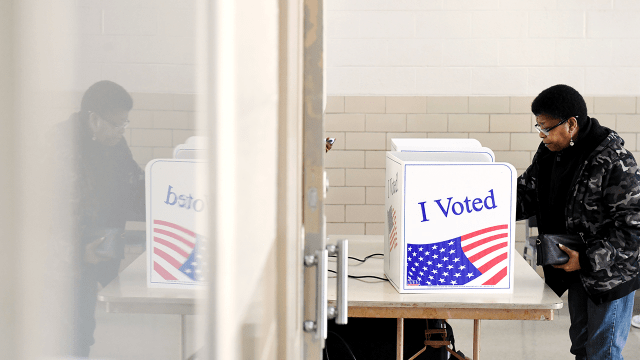
In the fateful four days from the South Carolina primary through Super Tuesday that transformed the battle for the Democratic presidential nomination, one recurring media narrative was – and continues to be today – the strong support for Joe Biden among black voters, support some analysts credit with saving the former vice president’s candidacy.
Black voters constitute a core element of the Democratic Party (for example, in 2017, non-Hispanic black adults composed 19% of Democratic registered voters). A new survey conducted Feb. 18 to March 2, 2020, as part of Pew Research Center’s Election News Pathways project finds that there are some notable differences between white and black Democrats in both news consumption habits and assessments of recent political events and figures in the news, according to the survey of 10,300 U.S. adults who are members of the Center’s American Trends Panel.
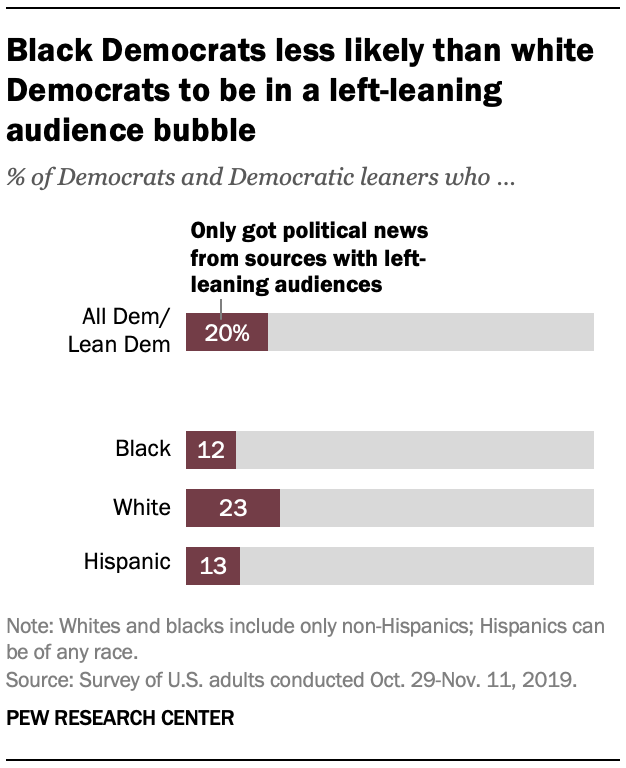
Black Democrats and black independents who lean Democratic are considerably less likely than their white counterparts to operate in a “media bubble,” consuming political news only from outlets that have left-leaning audiences, according a November 2019 Pew Research Center survey. According to a new Center analysis, 12% do, compared with 23% of white Democrats.
- In choosing media sources, black Democrats are more likely to get political and election news from Fox News (36%) than are white Democrats (17%). They also are more likely to look to CBS News and NBC News as sources. On the other hand, many more white than black Democrats get political news from The New York Times, The Washington Post and NPR. For example, 43% of white Democrats get news from NPR, compared with 10% of black Democrats. There are also some similarities in the media diets of these two groups: For example, large portions of both black and white Democrats turn to CNN for political news (56% of black Democrats and 52% of white Democrats).
- There is also substantial variation by race when it comes to how closely Democrats are following 2020 election news about the candidates. About half of black Democrats say they are following it very or fairly closely; that number jumps to about two-thirds of white Democrats.
In addition to differences in where and how closely they follow election news, black and white Democrats have somewhat differing views about key events and candidates in the 2020 campaign.
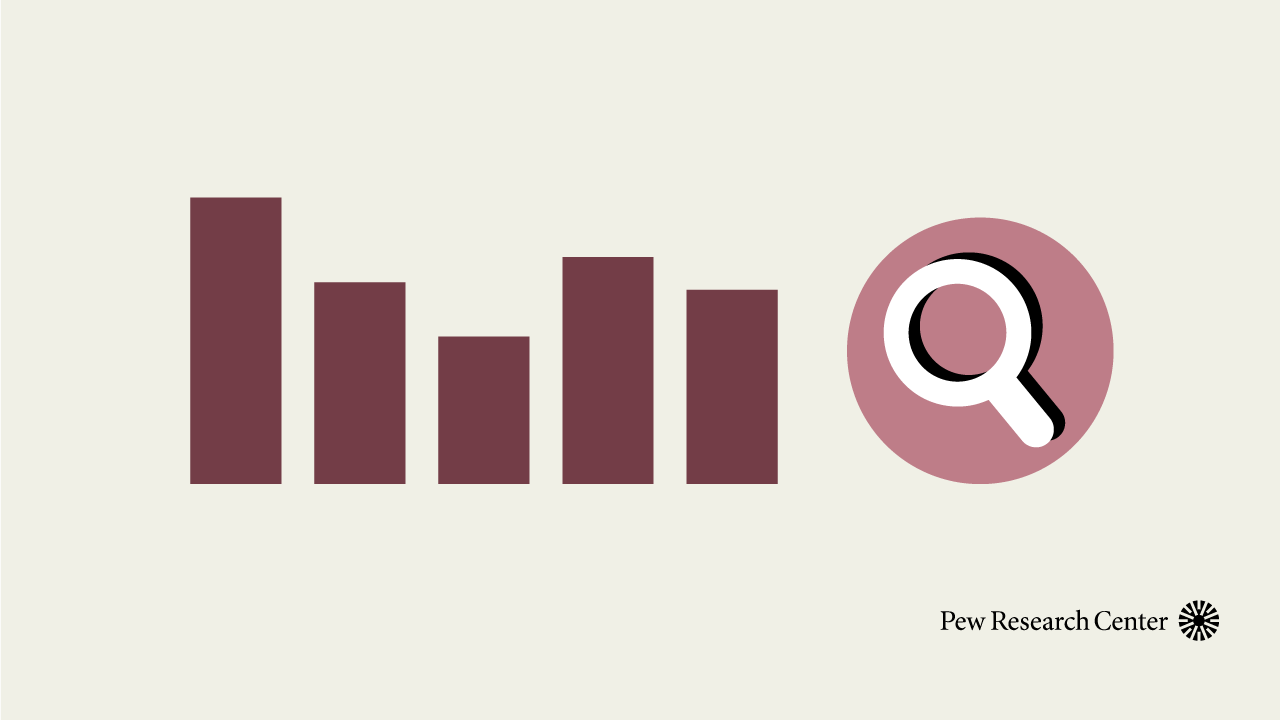
Want to see more data on these questions?
To analyze these survey questions by additional media habits and demographic characteristics, visit the interactive tool and access the dataset.
- While majorities of both black and white Democrats say they understand what’s been happening in the 2020 primaries very or somewhat well, black Democrats are less likely than white Democrats to say they understand what’s been happening very well.
- A plurality (42%) of black Democrats say they are not sure whether the delayed release of the results from the Feb. 3 Iowa Democratic caucus was at least partly intentional or completely unintentional, while a solid majority of white Democrats say it was completely unintentional.
- About four-in-ten white and black Democrats agree that Bernie Sanders had the best news coverage the weeks prior to Super Tuesday. But black Democrats are more likely than white Democrats to say that Biden received the most positive media attention (14% vs. 5%, respectively).
- Large shares of both black and white Democrats think that the news they saw about President Donald Trump was not very flattering in the prior couple of weeks. But black Democrats are even less inclined than white Democrats to say Trump received positive coverage.
This analysis focuses on differences between black and white Democrats. To find out more about Hispanic Democrats, use our interactive data tool or read upcoming analyses from the Center.
Fewer black Democrats operate in a political news media bubble than white Democrats
An earlier report from the Center’s Pathways project revealed that about 20% of Democrats and Democratic-leaning independents and of Republicans and Republican leaners are in a media bubble – getting political news in a given week only from outlets (among 30 outlets asked about) predominantly used by people who align with them politically and ideologically. But differences emerge by race. Only 12% of black Democrats are in a media bubble of sources with left-leaning audiences, compared with about twice as many white Democrats (23%).
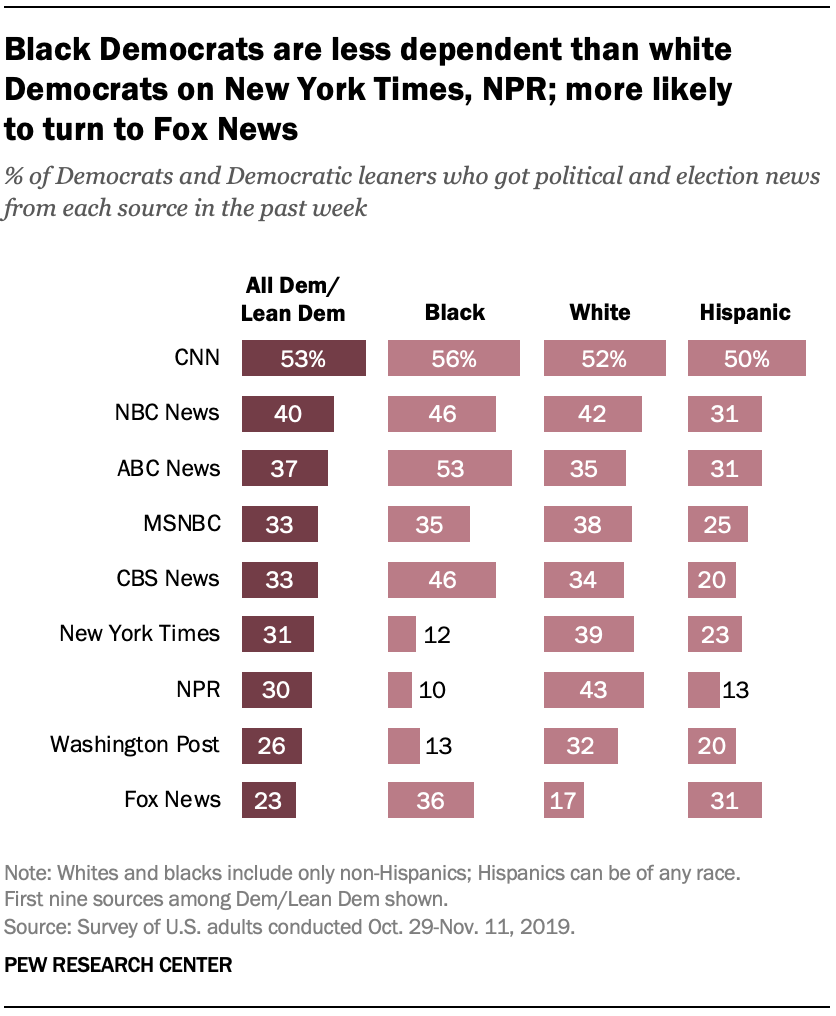
One way that black Democrats break out of the media bubble is that roughly a third (36%) get political news from Fox News, which, according to the Center’s survey data, has an audience that leans to the right politically. That contrasts sharply with the 17% of white Democrats who get political news from Fox.
In using sources for political news, black Democrats are also more inclined to turn to ABC News (53%) and CBS News (46%) than white Democrats (35% and 34%, respectively). White Democrats, however, are much more inclined to get political news from The New York Times (39%) than their black counterparts (12%). The same pattern holds for NPR (43% vs. 10%) and The Washington Post (32% vs. 13%).
In a separate question about the most common way people access political news, black Democrats express a higher reliance on local television (28%) than do white Democrats (10%), while white Democrats are more likely to get news through news websites or apps (32%, vs. 15% among black Democrats).
At least half of black and white Democrats say they are following news about the 2020 candidates very closely or fairly closely. But there is a notable variation within those levels of engagement. While about three-in-ten white Democrats (31%) say they are following this news very closely, that number drops by about half to 17% among black Democrats. Overall, 69% of white Democrats say they are following news about the candidates very or fairly closely, compared with 54% of black Democrats who say the same thing.
Black Democrats sense more positive news about Biden, less about Trump
Along with following news about the 2020 candidates less closely, black Democrats and Democratic leaners also express somewhat less confidence than white Democrats that they understand what’s been happening in the Democratic primaries to date. That primary process, leading up to the time of the survey, included about a dozen candidates, crowded debate stages, two billionaire candidates flooding the airwaves with ads and an Iowa caucus marred by delayed and even disputed results.
Overall, 63% of black Democrats and Democratic leaners say they understand what’s been happening in the primaries very well or somewhat well, compared with nearly three-quarters (73%) of white Democrats. That includes 18% of black Democrats and 26% of white Democrats who say they understand it very well.
Those lower levels of certainty among black Democrats around the facts and events of the primaries may be related to perceptions about whether the delay in releasing the Feb. 3 Iowa Democratic caucus results was completely unintentional or at least partly intentional.
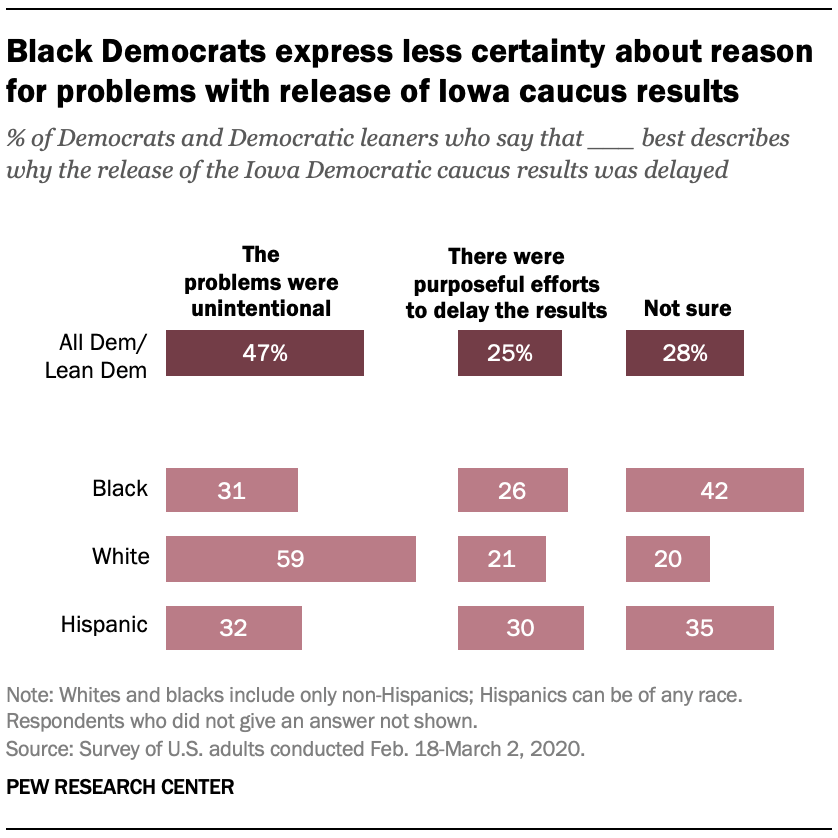
A majority of white Democrats (59%) say the snafu in Iowa was the result of unintentional problems and not major efforts to purposefully delay, compared with about three-in-ten (31%) of black Democrats who say the same. Instead, a plurality of black Democrats (42%) say they are not sure why the results were delayed, more than twice the percentage of white Democrats (20%) who also are unsure. The remaining 26% of black Democrats and 21% of white Democrats say that in addition to unintentional problems, there were also intentional efforts to delay the results.
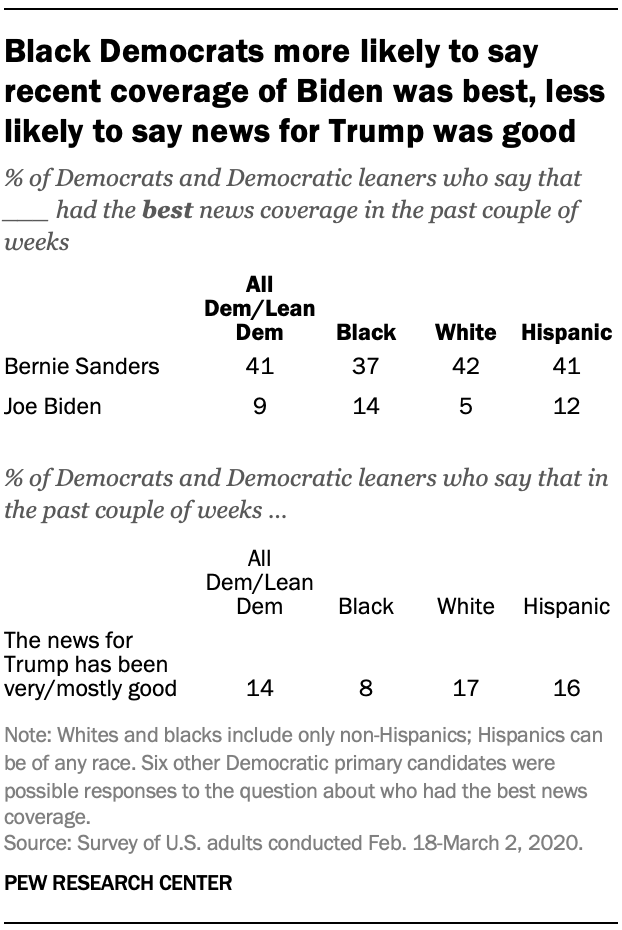
For much of the latter half of February and first two days of March, when the survey was administered, Bernie Sanders was considered a front-runner for the Democratic nomination in the media narrative. (That narrative did start to shift after the results of the Feb. 29 South Carolina primary in which support among black Democrats helped drive Biden to a big victory – the tail end of the survey field time.)
When asked about news coverage of candidates in the past couple of weeks, both black and white Democrats selected Sanders as the recipient of the best coverage, including 42% of white Democrats and 37% of black Democrats. At the same time, however, 14% of black Democrats said Biden enjoyed the best coverage in that period, compared with a mere 5% of white Democrats who felt the same way about Biden’s coverage.
And when it comes to assessing the news about Trump in the past couple of weeks, majorities of all Democrats described it as very or mostly bad, including about six-in-ten black and white Democrats (61% and 59%, respectively). But black members of this group expressed less willingness to put Trump’s coverage in a favorable light. About one-in-ten black Democrats characterized news about Trump as mostly or very good (8%) in that period, compared with 17% of white Democrats.
These measures and more can be explored further in the Election News Pathways data tool, where all of the data associated with this project is available for public use.
Data from this analysis comes from surveys conducted Oct. 29 to Nov. 11, 2019, and Feb. 18 to March 2, 2020. See the survey questions and methodology for this analysis, or access the dataset.
Acknowledgments: The Election News Pathways project was made possible by The Pew Charitable Trusts. Pew Research Center is a subsidiary of The Pew Charitable Trusts, its primary funder. This initiative is a collaborative effort based on the input and analysis of a number of individuals and experts at Pew Research Center.




